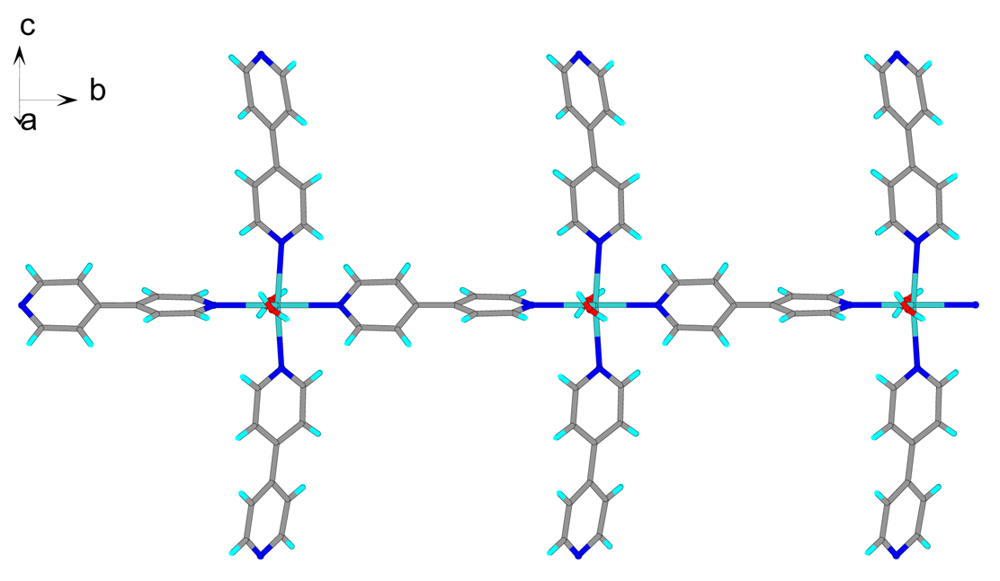University Subjects
CHM2990: Introductory chemical research project
CHM2990: Introductory chemical research project
- University
- Monash University
- Subject Link
- View Subject
keltingmeith
10 years ago
- Assessment
-
- Lab work/supervisor mark (30%)
- Oral presentation (10%) (have heard gossip that this is changing to a poster presentation)
- Report (60%)
- Comments
-
This is the best unit I have ever done. If you read my MTH3241 review, ignore that - that unit was a piece of shit compared to this one. The rest of these comments will be rambling. I hope you like rambling.

What I Did:
So, before I begin, a quick outline of what I did:
If you imagine a coordination complex with a metal, it looks something like this:
Now, question - what happens if each of the ligands bridge to another coordination complex? Well, you get something that looks like this:
NOW, what if you bridge that to another complex? And another? And another? Well, you get a polymer! This particular type of polymer is known as a coordination polymer, and so my project revolved around the synthesis and characterisation of a novel coordination polymer.
And just for completeness, here's a 2D coordination polymer (you can get them in 1, 2 or 3 dimensions):
What Did I Do?/What Might You Do?
So, this varies from project to project, but the best part of the unit is that you'll get to develop your lab skills - whether they be synthetic or analytical skills. This is in particular to analytical techniques you don't get to do in undergrad - I can very easily run IRs now, set up reflux stuff, weighing is super easy (and no longer seems annoying!) and I've even got to run NMRs and done some crystallography at the synchrotron! (take THAT DisaFear. )
)
Wasn't it SCARY???
Ehhhh. Yes, it is a little scary when you're filling in your safety stuff at the start, and one of the MSDS simply lists "fatal if inhaled", as opposed to the usual "might cause cancer" or what have you. But the excitement so easily takes over that you don't notice. Plus, the chem people at Monash are generally nice, helpful people, and that makes things SO much easier.
Overall?10/10, would recommend. Do it. Happy to be PMed about picking supervisors and stuff if you want someone to chat to/you're super excited by everything and nobody is willing to share in the excitement with you. - Lecturer(s)
-
N/A. The unit coordinator is David Turner, and he'll correspond a bit. Most of your discussion will be between your supervisor and their research group, so your mileage may vary. (My supervisor was David Turner, for comparison)
- Past Exams Available
-
No exam, your group should have some past reports/theses they can show you to help you with writing your report, though.
- Rating
-
7 out of 5
- Recorded Lectures
-
No lectures.
- Textbook Recommendation
-
None you need to buy - you might find you'll need to borrow a book depending on your project, but it'll probs be so niche there'll be 5 borrowable copies in the library.
- Workload
-
Varies depending on project and availability (generally, your availability). About 8-10 hours of labwork recommended per week. This could be done all in one day (what most people opt to), the whole week (what I did), or anywhere in-between.
- Year & Semester Of Completion
-
Semester 2, 2015
- Your Mark / Grade
-
TBC
DisaFear
11 years ago
- Comments
-
This is going to be really long. So hold onto your horses. - Lecturer(s)
-
No lecturer for this unit. However, I worked under:
- Dr. Gregory Knowles (supervisor)
- Professor Alan Chaffee (group leader)
- Professor Douglas MacFarlane (group leader)
- Past Exams Available
-
No exams for this unit
- Rating
-
6/5
- Recorded Lectures
-
No lectures for this unit
- Textbook Recommendation
-
No textbook for this unit
- Workload
-
- Depends on the project you choose really...say 7-10 hours of lab work per week
- Year & Semester Of Completion
-
2013/2014 Summer Semester
- Your Mark / Grade
-
82 HD
Study Honours at the no.1 university in Australia
Open to students from all universities, Honours in Biomedical and Health Sciences builds on your bachelor’s degree in science or health and enables you to explore your interests in research. If you’re interested in pursuing a PhD or becoming a qualified health professional, then Honours is an ideal pathway.
Find out more
